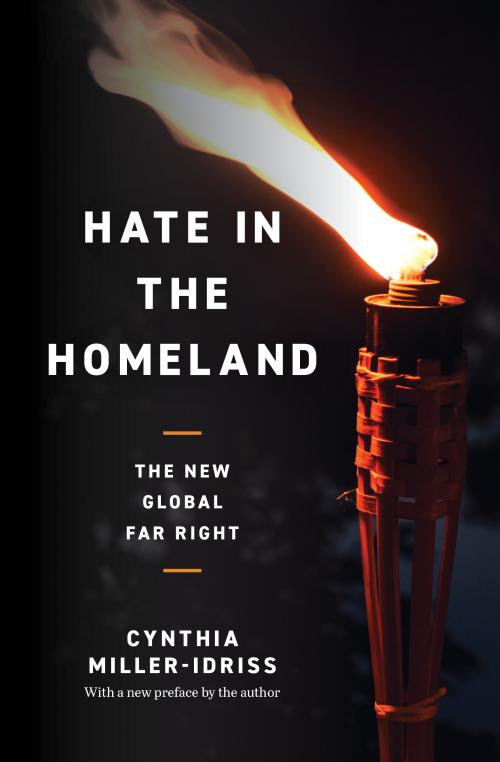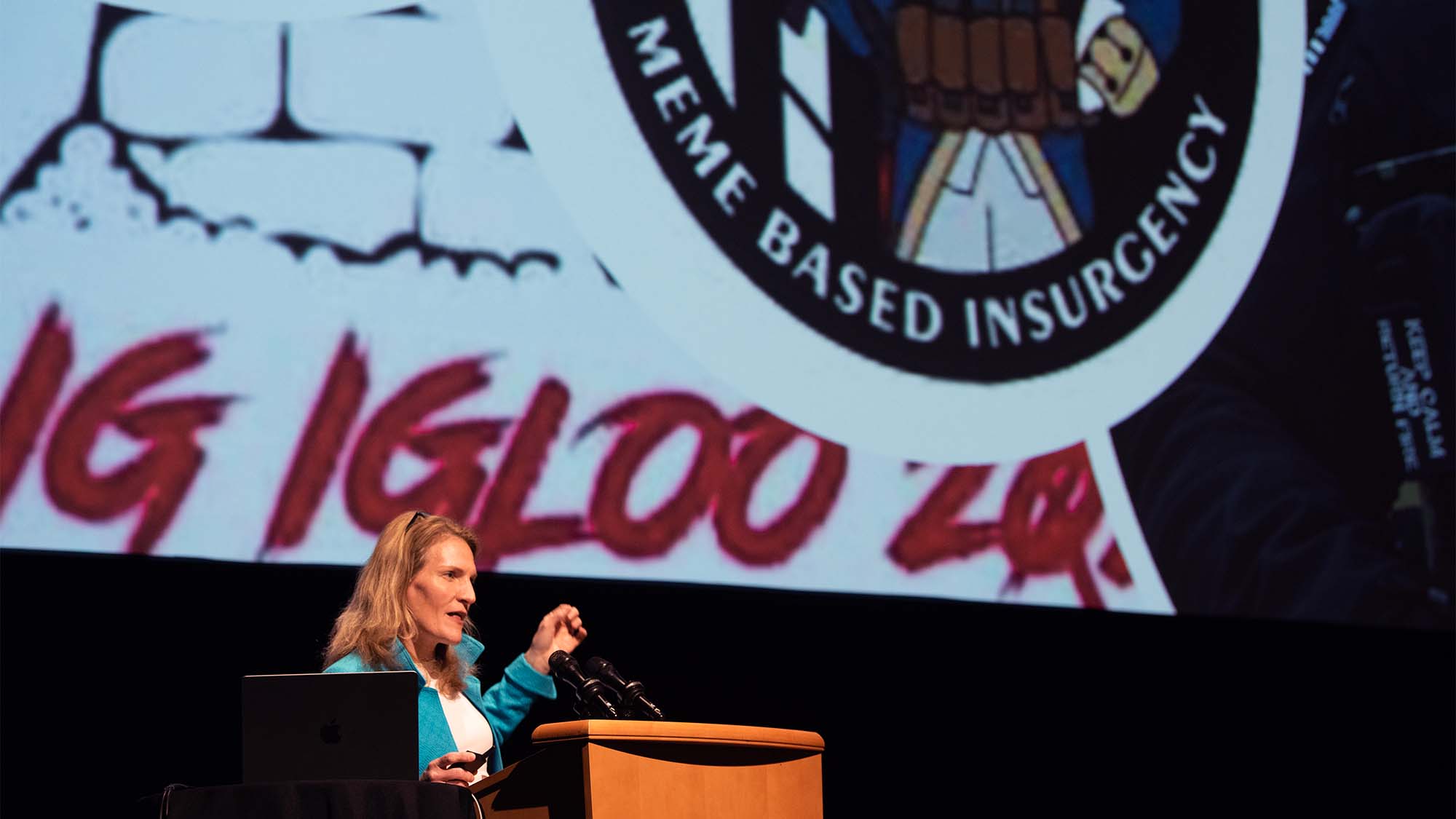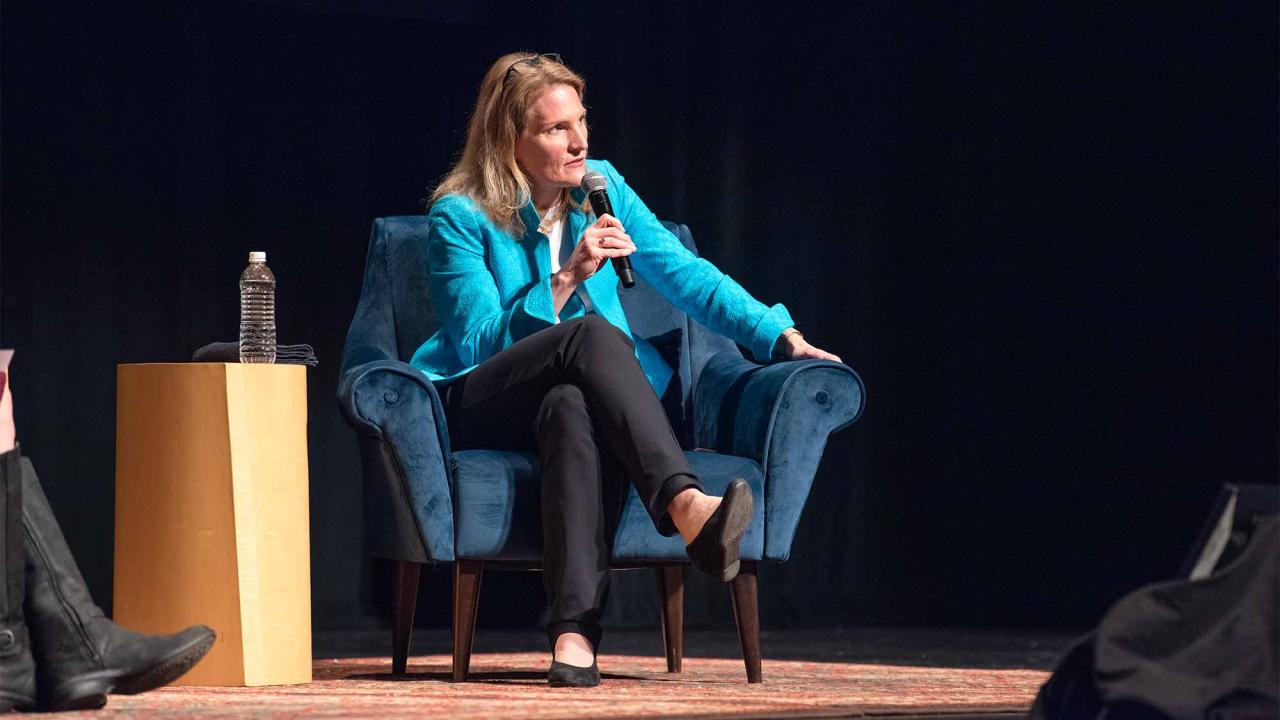Quick Summary
- Author visit caps year of book project programming
- ‘Hate in the Homeland’ centers on the ways extremist beliefs are cultivated
- More education is key to rejecting hateful propaganda, author says
In front of a Mondavi Center crowd last week, author Cynthia Miller-Idriss identified two recent moments — the mid-2000s in Germany and the global rise of social media in the later 2010s — as inflection points for new far-right attempts at youth radicalization and recruitment. This included far-right clothing outfits with a “more mainstream appearance” that marked “the legality of toeing the line” of acceptable speech in German society, including clothes featuring modifications of banned words, like the deletion of their vowels or formatting them within popular motifs like the logo of the hip-hop group Run-DMC. These provocations forced governments to answer the question Miller-Idriss posed to the campus audience: “Is it still a far-right symbol if nobody recognizes it?”
In a digital, mobile-first world, using tools like social media to make far-right content more mainstream puts democracies like the United States at risk. In the wake of a decentralized but increasingly violent far-right risk, recognizing extremist symbology, according to Miller-Idriss, is a crucial step towards combating it and fighting instead for a democratic society.
Book project selection

The Mondavi Center hosted Miller-Idriss Feb. 5. She is an expert on identifying and combating extremism worldwide, and her book, Hate in the Homeland: The New Global Far Right, was the 2023-24 selection for the UC Davis Campus Community Book Project.
The project was created in 2002 by the Office of Campus and Community Relations, a unit now in the Office of Diversity, Equity and Inclusion, to promote dialogue and build community by encouraging diverse members of the campus and surrounding communities to read the same book and attend related events. A volunteer committee of students, staff, faculty and community members considered more than 60 book nominations. The office’s website notes that Hate in the Homeland “shifts the conversation about radicalization from the how and why to the when and where, to the life stages and places where extremist beliefs are cultivated and socialized.”
Miller-Idriss is a professor in the School of Public Affairs and in the School of Education at the American University in Washington, D.C. The university houses the Polarization and Extremism Research and Innovation Lab, of which Miller-Idriss is the founding director. She regularly testifies before Congress and briefs policy, security, education and intelligence agencies on trends in domestic violent extremism and strategies for prevention and disengagement.
Hate online

Miller-Idriss’ presentation also traced the origins of those who used far-right memes to create online and actual acts of violence, including meme-inspired flags waved during the attacks on the U.S. Capitol on Jan. 6, 2021. The “weaponization of youth culture” through a social media-driven “meme warfare” was part of a larger desire from far-right movements to “own the counter-cultural position … attractive for young men,” she said.
Sophisticated tactics including using social media’s aesthetic templates to transmit extremist content without being flagged by content moderators. She particularly noted that five murders were directly connected to the loosely organized Boogaloo Boys, and that these groups and their visuals posed “real terrorism mobilized by a meme” and were “hard for a generation of security officials” to combat. Officials were accustomed to fighting groups with defined structural leaderships, not a series of decentralized groups living a “choose-your-own-adventure radicalism” that targets colleges as recruitment centers with flyer drops in lecture halls.
Searching for solutions
A question and answer session followed Miller-Idriss’ presentation, with a line quickly assembling. Attendees asked about the impact of the pandemic and the increasing extremist rhetoric used by leading politicians, including presidential candidates. Two book club members from Dixon and Davis high schools asked for solutions students could use to combat extremism. Miller-Idriss reiterated a “holisitc, public health approach” akin to encouraging healthy eating, and encouraged connecting the combating and identifying of extremism as something “rooted in community needs.”
She also noted strategies towards solutions, including “preemptive education campaigns” designed for youth to understand what they’re seeing before they see it. She also cited the success of short “video-based interventions” learning from Germany’s “primary prevention approaches” and also cited successful prevention and awareness models in Norway and New Zealand. She also cited a resource and reader’s guide published with the Western States Center.
Ultimately, Miller-Idriss said she hopes to “equip everyone in the mainstream to reject propaganda” through awareness and education campaigns like last week’s event.
Media Resources
José Vadi is a writer for Dateline UC Davis, and can be reached by email.
